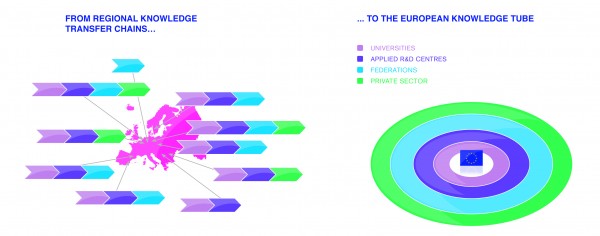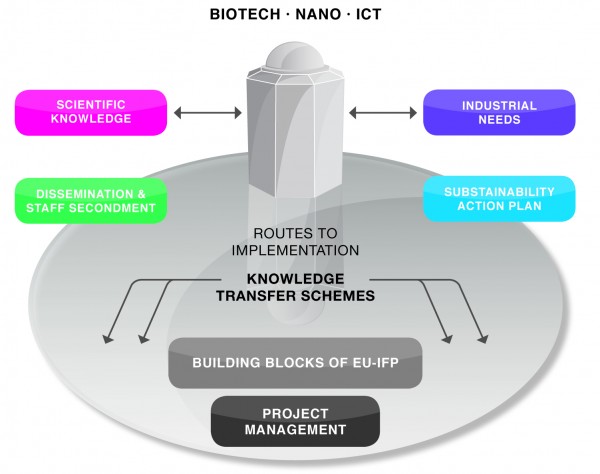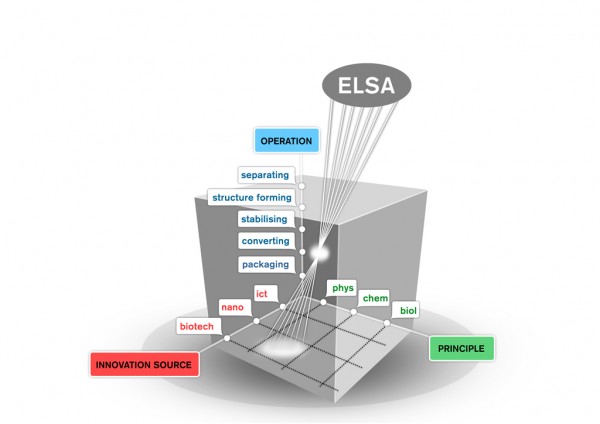HIGHTECH EUROPE: A network fostering innovation in food processing
- Like
- Digg
- Del
- Tumblr
- VKontakte
- Buffer
- Love This
- Odnoklassniki
- Meneame
- Blogger
- Amazon
- Yahoo Mail
- Gmail
- AOL
- Newsvine
- HackerNews
- Evernote
- MySpace
- Mail.ru
- Viadeo
- Line
- Comments
- Yummly
- SMS
- Viber
- Telegram
- Subscribe
- Skype
- Facebook Messenger
- Kakao
- LiveJournal
- Yammer
- Edgar
- Fintel
- Mix
- Instapaper
- Copy Link
Posted: 30 June 2010 | Dr. Kerstin Lienemann, Manager DIL Office Brussels, Deutsches Institut für Lebensmitteltechnik e.V. & dr. ir. Iesel Van der Plancken, Senior Researcher, Laboratory of Food Technology, Katholieke Universiteit & Annika Gering Project Manager, ttz Bremerhaven | No comments yet
Bio-, nano- and information and communication technology show high innovative power within high-tech food processing technologies. Excellent research has been carried out but has not always led to substantial innovations on the market. This European Innovation Paradox is at least partly due to a lack of knowledge transfer, especially between science and industry, and between regions or cross-border. It becomes evident that the process of research and development (R&D), implementation and application of high-tech food processing technologies requires tailor-made multidisciplinary solutions.
Bio-, nano- and information and communication technology show high innovative power within high-tech food processing technologies. Excellent research has been carried out but has not always led to substantial innovations on the market. This European Innovation Paradox is at least partly due to a lack of knowledge transfer, especially between science and industry, and between regions or cross-border. It becomes evident that the process of research and development (R&D), implementation and application of high-tech food processing technologies requires tailor-made multidisciplinary solutions.
Bio-, nano- and information and communication technology show high innovative power within high-tech food processing technologies. Excellent research has been carried out but has not always led to substantial innovations on the market. This European Innovation Paradox is at least partly due to a lack of knowledge transfer, especially between science and industry, and between regions or cross-border. It becomes evident that the process of research and development (R&D), implementation and application of high-tech food processing technologies requires tailor-made multidisciplinary solutions.
The approach of HighTech Europe, the first European food processing Network of Excellence (NoE), is the establishment of a European innovation window for the food processing sector. Forming interdisciplinary and interactive communication and collaboration platforms will facilitate direct implementation of innovations into SMEs.
HighTech Europe aims at achieving long-lasting integration of European R&D activities into the high-tech food processing sector. By increasing the innovation rate in this area, stimulating new market opportunities and overcoming knowledge transfer barriers, the leadership in global markets will be assured.
The NoE is considered as the instrumental strategic incubator for the development of new concepts and ideas enabling competition of the European agro-food industry. HighTech Europe will provide a nucleus for establishing the European Institute for Food Processing (EU-IFP) which collects, maps, monitors and links industrial needs and available R&D results. Thus, implementation and application of sustainable high-tech food processing technologies in different regions of Europe will be supported and adapted to the needs of local enterprises. Intensive communication and cooperation between universities, applied R&D centres and the private sector (federations, industry) will permit translation of scientific results into marketable industrial applications with special benefits for SMEs.


Figure 1 Knowledge transfer chain and knowledge tube
New route to implement knowledge
One of these new concepts is the Science Cube. It is a model to describe knowledge precisely by categorising the knowledge into relations to food processing operations, to scientific principles (biological, chemical and physical) and to new innovation sources. Biotechnology, nanotechnology and information and communication technology are booming areas and next-generation technologies. Hence, they are promising innovation sources for high-tech food processing technologies that might even replace traditional processing means. The food matrix is the fourth dimension of the Science Cube.
Experts within HighTech Europe identify and evaluate available and forthcoming knowledge and technologies. They link these to industrial needs of companies, especially of small and medium enterprise of which most do not even have own units for research and development. Industrial needs are gathered by targeted interviews as well as by literature research.
An interactive technology portal is the tool of choice to elucidate to industry the complex knowledge available and to give them the possibility to search for specific and targeted solutions. The portal in MediaWiki style will use ontology to structure the data. Ontology is in this case a mechanism for specification, a way to connect information and to organise sources of innovations. In this context, the ontology is used to enable advanced search formulation for the end-user. One of the main barriers to knowledge and technology transfer is the use of different languages by academia and industry. The interactive technology portal meets this concern. It will be able to match concepts – for example a technical term (needs) used by industry – with concepts used by academia that might bear scientific solutions the user has not thought of before. The overall aim is to supply potential for innovations for the food processing industry. The portal will provide summarising technology data sheets, profiles of research institutes and enterprises, explanations to special industrial needs, literature references and more.
The so-called Lighthouse Watcher concept describes the selection and evaluation procedure to manage, maintain and expand the portal and to build up a comprehensive Science Cube-database. The Lighthouse Watcher uses the knowledge and expertise of people from the growing HighTech Europe network.
The Interactive Technology Portal is the prominent building block of HighTech Europe and it is accompanied by various activities to transfer knowledge and to establish a new innovation tunnel for the European food industry. During the whole lifetime of the project, several innovation and technology workshops will be organised in Europe demonstrating available innovation potential to industry. The series of workshops started in March at the SALIMA in Brno, Czech Republic, where the latest findings in the area of food packaging have been demonstrated. The next workshop ‘Smart Process Control & Automation’ will be held in cooperation with the 5th International Conference of the Food Factory of the Future in Gothenburg, Sweden (1 July 2010).


Figure 2 Lighthouse Watcher
Project beneficiaries will investigate next generation technologies with respect to their potential applicability in different areas of the food industries. Based on this, feasibility studies technologies and processes will be selected for demonstration in an industrial environment. Again, this will be organised as a series of eight technology or process-related workshops in Belgium, Germany, Romania and the Netherlands from 2011.
The agenda of HighTech Europe comprises new routes to implement knowledge such as an Agenda for a White Book on high-tech food processing for policy and regulatory bodies, a Knowledge Auction auctioning unique pieces of knowledge and an Implementation Award honouring full chain innovations.
European Food Processing Implementation Award
In line with its objectives of bringing food research and industry closer together and promoting high-tech innovation in food industry, HighTech Europe has recently launched the European Food Processing Implementation Award. This bi-annual award will honour innovations in food processing and improvement of food quality that have been successfully developed along a knowledge transfer chain. The first award ceremony will be held at the next EFFoST-EHEDG conference in Dublin, Ireland (10 – 12 November 2010). The European Food Processing Implementation Award consists of a work of art. In addition, the winners can carry the logo ‘Winner of the European Food Processing Implementation Award’ for two years.
The award’s final goal is to encourage small and medium-sized enterprises in the food and feed production industry to adopt innovative knowledge – in particular, the latest findings from biotechnology, nanotechnology as well as information and communication technology – to strengthen them for global competition.
Individuals, companies and institutes active within the field of food research or food industry can apply for the European Food Processing Implementation Award. Only recent innovations (within the last three years) originating from the area of biotechnology, nanotechnology or ICT that can be applied for improvement of food quality or food processing schemes will be considered. As the European Food Processing Implementation Award serves as an incentive for cooperation between research institutes and food industry, innovations resulting from interdisciplinary and inter-sectoral efforts will be favoured.


Figure 3 Science Cube
Facts and figures of the HighTech Europe project
HighTech Europe is a Network of Excellence financially supported by the 7th Framework Programme of the European Commission. Twenty-one European partners from research institutes to technology transfer centres, food associations and enterprises are forming the HighTech Europe network. Not to forget CSIRO (Australia’s Commonwealth Scientific and Industrial Research Organisation), 22nd partner of the consortium, contributing with its broad expertise and experience in knowledge transfer in Australia. The aim of the initiative is to make innovative technological knowledge available for industry, especially small and medium-sized enterprises (SMEs) in the food producing industry.
The coordinator of the project is the German Institute of Food Technologies (DIL e.V.). The project started in May 2009 and will last four years. The overall budget of HighTech Europe is around EUR 7 million, whereof 5.8 million is contributed by the European Commission. Experts from industry and academia can join the network via the Associated Membership Platform to participate in HighTech Europe activities. Furthermore, the platform will serve as basis for future joint activities in order to establish a European Institute of Food Processing.
HighTech Europe will develop the building blocks for the EU-IFP that enables members’ activities to be better coordinated and integrated, including sharing of resources between them and identifying intersections to avoid duplication.




